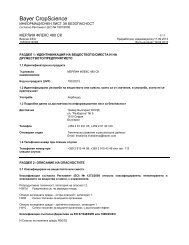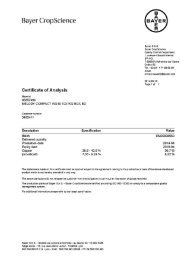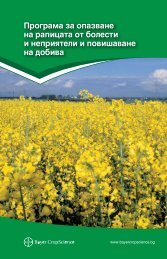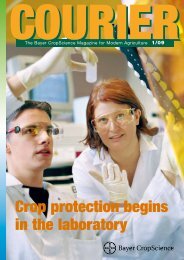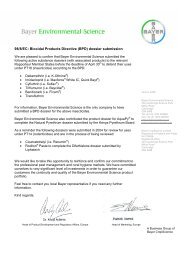For healthy potatoes - Bayer CropScience
For healthy potatoes - Bayer CropScience
For healthy potatoes - Bayer CropScience
You also want an ePaper? Increase the reach of your titles
YUMPU automatically turns print PDFs into web optimized ePapers that Google loves.
A further fitness-advantage of the<br />
„new“ population is that it has a shorter<br />
latent period, i.e. the interval between<br />
infection and the appearance of symptoms<br />
(see Fig. 1). Whereas the standard latent<br />
period quoted for the pathogen Phytophthora<br />
infestans used to be 5 to 7 days, isolates<br />
collected from the field nowadays<br />
show latent periods of less than 3 days.<br />
The latent period is a vital indicator in<br />
epidemiological terms. A shorter latent<br />
period means that more generations can<br />
occur within a year. The latent period also<br />
has an important influence on the likelihood<br />
of success of curative treatments to<br />
control of the pathogen. These differences<br />
in the properties of the „new“ population<br />
indicate that the pathogen is „fitter“: in<br />
other words, more aggressive. This<br />
increased fitness of the “new” population<br />
explains why it has been able to out-compete<br />
the old population in most areas of<br />
potato cultivation within only a few years.<br />
Implications for<br />
agricultural practice<br />
The results of tests of the effectiveness of<br />
curative treatments show that it is almost<br />
impossible to prevent the outbreak of an<br />
epidemic once infection has become successfully<br />
established. Therefore, it is<br />
important that the establishment of the<br />
pathogen is avoided through preventative<br />
measures. A pre-condition for this is the<br />
correct timing of the start of the spraying<br />
programme, before the first symptoms<br />
appear. Computer-aided decision models<br />
are an important tool in planning timely<br />
fungicide applications. Modern communications<br />
media provide the basis for the<br />
rapid translation of decision into action.<br />
The integration of the latest research<br />
results coming from the areas of phytopathology,<br />
plant breeding and crop protection<br />
will provide the basis for the successful<br />
control of the pathogen Phytophthora<br />
infestans into the future. ■<br />
New, ultimate protection of<br />
<strong>potatoes</strong><br />
The increasing Phytophthora infection pressure has urged scientific research for<br />
the search for new control technologies. With fluopicolide, <strong>Bayer</strong> <strong>CropScience</strong> has<br />
developed a promising, new-generation active substance for the control of late<br />
blight in <strong>potatoes</strong>. This modern product provides an innovative form of disease<br />
control, with a long-lasting action.<br />
Fluopicolide is the first active substance in the new class of acylpicolides. It has<br />
a novel mode-of-action that allows it to provide effective and sustained control of<br />
late blight, targeting all the important stages of the pathogen’s life-cycle. Both<br />
direct and indirect germination of the spores and sporangia are inhibited, along<br />
with the sexual reproduction of the pathogen.<br />
Fluopicolide is an active substance with translaminar properties: following<br />
application to the upper side of the leaf, the active substance penetrates the<br />
leafsurface and moves into the leaf tissues, providing protection through to the<br />
underside of the leaf. If applied to the leaf-base or the petiole, the active substance<br />
is distributed towards the leaves: this property means that it is capable of<br />
protecting the new growth that develops between successive spray applications.<br />
In 2006, <strong>Bayer</strong> <strong>CropScience</strong> obtained the first registrations for fluopicolide, in the<br />
UK and China. Further registrations are expected in coming years.<br />
Fluopicolide is marketed for use in <strong>potatoes</strong> in a mixture with propamocarb,<br />
under the trade name Infinito ® . The two active substances fluopicolide and<br />
propamocarb complement each other perfectly: they offer the farmer an effective<br />
tool for avoiding the development of resistance. Infinito can also be used against<br />
strains of oomycete fungi that are resistant against standard fungicides.<br />
Field trials in recent years have demonstrated Infinito’s robust and very high level<br />
of action against Phytophthora infestans infections on leaves and stems and<br />
tubers. Also the international field trials clearly demonstrated the reliable longlasting<br />
protection it brings. Thanks to its very favourable environmental profile,<br />
Infinito is suitable for use in integrated crop management programmes and a<br />
product of choice for the partners in the food chain.<br />
<strong>Bayer</strong> <strong>CropScience</strong> is currently testing this highly-active fungicide in trials around<br />
the world, in order to develop it into a product for controlling downy mildew in<br />
vegetables, ornamental plants and grapes. <strong>For</strong> example, fluopicolide will be made<br />
available for use in grapes in a pre-mix, under the trade name Profiler ® .<br />
2/06 COURIER 15






